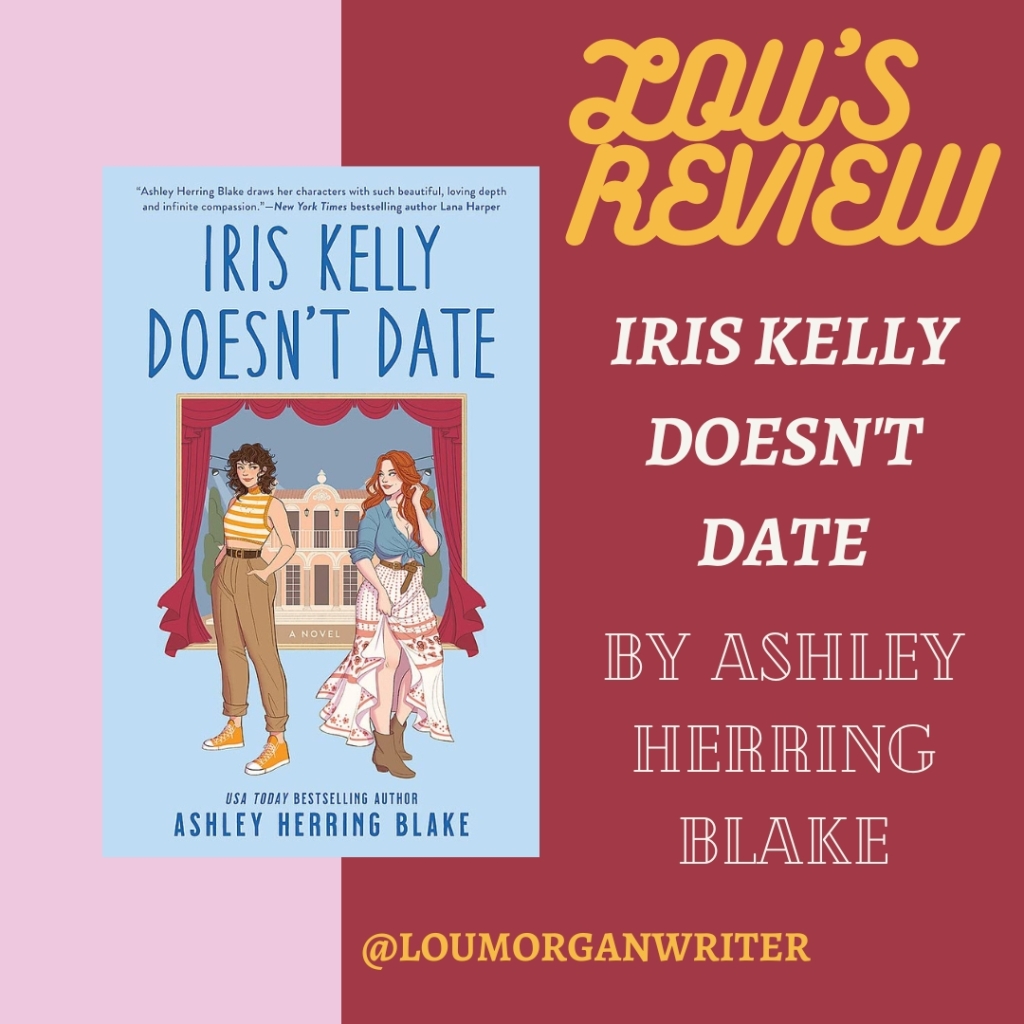Delilah Green Doesn’t Care remains one of the best romances I’ve ever read. That novel forever changed my perspective on this genre, and deepened my love for it. Full disclosure: I had mixed feelings about the sequel, Astrid Parker Doesn’t Fail. And – to be brutally honest – I didn’t much like Iris in the first two Bright Falls books. But, based on the strength of Delilah Green, I decided to finish reading the trilogy. And that’s one of the best decisions I’ve ever made as a reader. Iris Kelly Doesn’t Date is my favourite instalment of the series, and among my top reads of 2023.
After her last two relationships ended in complete and utter emotional annihilation, Iris Kelly is done with dating. It doesn’t matter that her mum keeps trying to set her up, dropping hints about marriage and motherhood subtle as an atomic bomb. Or that all her friends are coupled up and Iris is a fifth wheel. Even though she’s a romance author, Iris is fed up with love. And when her hook-up with a socially awkward lesbian ends in Iris being puked on – not quite the exchange of bodily fluids she’d envisioned – it’s like the world is proving her right.
Though Stevie Scott is confident performing on stage, in real life it’s another story. Her acting career has stalled, and her girlfriend of six years recently left Stevie for a stunning mutual friend, and a hook-up makes her so anxious that Stevie pukes over the gorgeous redhead she met in a bar. Never expecting to see Iris again, Stevie tells her friends they’re dating, a lie to buy some breathing space. But then Iris is cast opposite her in the LGBT Shakespeare play being directed by her ex. And while their hook-up didn’t work out in real life, a fake relationship serves both their interests.
Iris Kelly is a truly remarkable novel. Herring Blake’s prose is light, funny, and achingly beautiful. She’s a writer at the top of her game, with every aspect of this book combining to create a perfect whole. The plot, tropes, pacing, style, and whip-smart dialogue are all sensational. And the banter between characters is unmatched: Ashley Herring Blake could teach a master class on dialogue. But it’s her characterisation that earned this novel’s place in my heart.
I was wrong about Iris. Completely. The in-your-face brashness that I’d found so off-putting is nothing more than a defence mechanism against rejection, a way of warding off the perception she’s never good enough. It’s a surface-level trait designed to hide the sweetness and vulnerability underneath. I wasn’t the slightest bit irritated by Iris this time around – in fact, my heart ached for her each time she felt the need to perform. No character in this series, or any other romance novel I’ve ever read, has felt more deserving of her own Happily Ever After.
And Stevie. Stevie Scott just might be the best depiction of anxiety I’ve ever read. Mental illness doesn’t define who she is as a person. But it does shape Stevie’s responses to most situations, and influence how she moves through the world. Aspects of Stevie’s arc felt profoundly personal in ways that could fill an entire essay (perhaps I’ll do a Books in Profile post when I listen to the audiobook next year), but for now I’ll simply say that her chapters resonate with an incredible emotional truth.
Also, the plot! Iris Kelly is an utterly delicious story. Our leading ladies both have profoundly moving growth arc that not only convince, but fully satisfy. The end to this novel and series? Perfection. Plus, the concept of a lesbian-owned theatre group specialising in LGBT Shakespeare retellings is iconic! Even if Adri – said owner, and Stevie’s ex – is a complete and utter nightmare, breaking Stevie’s heart then reeling her back in before she has a chance to heal. The pull Stevie feels between a familiar past and an exciting new future add exquisite tension to the story.
My only criticism is that it would have been good to see more of the big moments in their performances as Beatrice and Benedick. Much Ado About Nothing is such a big part of the story – Stevie agrees to star because she desperately wants to save the theatre. And Iris does because she urgently needs to unblock herself creatively to finish her second book. The stakes are already high, and escalated by way Iris and Stevie fall for one another both as themselves and in character during the play. Which makes it frustrating when the performances are glossed over.
That said – when it comes to Iris’s career – the meta aspect of this story works well, adding humour and depth to the narrative. As a romance author, Iris speculates about how certain tropes and plot beats would translate into real life, only to undergo those experiences in her own story. This dramatic conceit is toe-curlingly good fun, a way of enabling readers to look at familiar plot devices with fresh eyes. The love Iris feels for the genre perfectly echoes the sentiments of Herring Blake’s likely readers.
Iris Kelly Doesn’t Date is a pleasure from start to finish. Romance at its very best. With this book Herring Blake has confirmed her position as a titan within the genre. I’m sorry that the Bright Falls series has come to an end, but so looking forward to reading Make the Season Bright – Herring Blake’s first foray into seasonal romance.

2 responses to “Lou’s Review: Iris Kelly Doesn’t Date, by Ashley Herring Blake”
[…] been craving all along. By sitting with that darkness, Delilah finds the light – new joy in her friendships, family connections, and romantic […]
LikeLike
[…] Iris Kelly Doesn’t Date, by Ashley […]
LikeLike